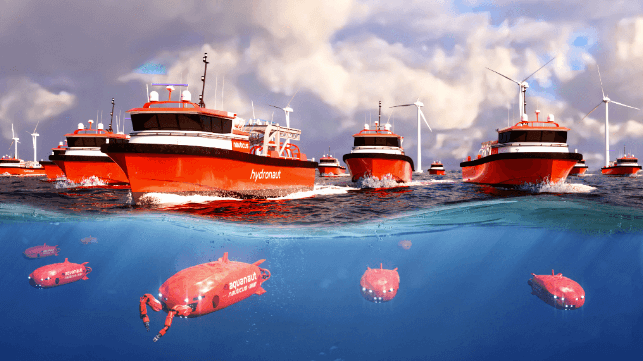Nauticus Moves Forward With its Unmanned Subsea-Service Fleet

Houston-based autonomous vessel developer Nauticus Robotics has launched an initial production run of paired USV/AUV platforms. Its self-driving support boats will transport and deploy autonomous, untethered submersibles to perform survey, maintenance and subsea intervention work - without the cost and carbon footprint of a large manned survey vessel.
Nauticus plans to build 20 USV/AUV pairs and deploy them in offshore hotspots like the Gulf of Mexico, Norway, the UK and Brazil. The first two will be delivered towards the end of this year, and the rest will arrive by 2024.
“Nauticus Fleet represents the most promising operational and technological step changes in this industry,” said Nicolaus Radford, CEO of Nauticus. “We are on a mission to create a future where more autonomous and intelligent robots are used to significantly reduce environmental impact and human exposure to hazards, while at the same time improving the bottom line for our clients.”
The operating concept is similar to Ocean Infinity's Armada program, a fleet of 23 unmanned AUV carrier / survey vessels announced in 2020 and currently under construction at Vard Vung Tao. The Wilhelmsen/Kongsberg-backed Reach Subsea USV program is also comparable, though smaller in scale.
Nauticus' USV is an 18-meter, optionally manned workboat (dubbed Hydronaut) which supports the launch and recovery of an AUV (Aquanaut), a free-swimming submersible linked to the USV by acoustic communications. It can conduct subsea surveys, but it is also fitted with two work-class manipulator arms to carry out manual tasks underwater. The USV provides charging, communications and transport to the Aquanaut for deployment and operations.

that matters most
Get the latest maritime news delivered to your inbox daily.
The growing proliferation of unmanned survey-and-subsea operators suggests a significant labor market shakeup may be coming to the complex, high-skill field of subsea services. Like Ocean Infinity and Reach Subsea, Nauticus expects that removing large, manned survey vessels from the equation will reduce offshore personnel (90 percent less), greenhouse gas emissions (90 percent less), and opex (50 percent less).
The business concept will soon be put to the test on the NASDAQ exchange, where Nauticus will be listed within the next few months through a SPAC merger. Nauticus has backing from some of the biggest names in the business, including Schlumberger, Transocean and drone builder AeroVironment.
